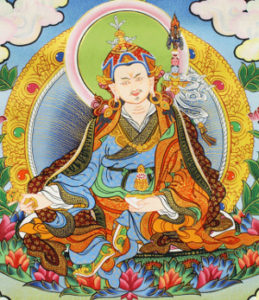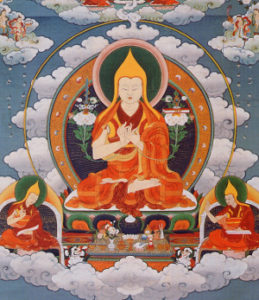Tibetan Buddhism
Buddhism began in India 2,500 years ago when Prince Siddhartha Gautama (ca. 563/480–ca. 483/400 BCE), seeking the way to perfect peace and happiness for all sentient beings, achieved enlightenment beneath the Bodhi Tree.
Introduced to Tibet under King Songtsän Gampo (618–49) when Sanskrit scriptures were translated into Tibetan, Buddhism flourished there beginning with the reign of King Trisong Detsen (755–97), notably due to a long visit by the fully-enlightened tantric master, Padmasambhava, also known as Guru Rinpoche.
A second transmission to Tibet took place from the 10th to the 12th century, especially with Atiśa (982–1054), and a significant reformation took place during the 14th century with Je Tsongkhapa (1357–1419). Buddhism was an integral aspect of Tibetan society under the leadership of the Dalai Lamas, which remained essentially isolated until the early 20th century with Thubten Gyatso, the 13th Dalai Lama (1876–1933), who enacted governmental and political reform and maintained connections with the West.
Following the Chinese occupation of Tibet in 1949, the present and 14th Dalai Lama, Tenzin Gyatso (b.1935), left for India and many Tibetans followed him into exile. Since then, Tibetan Buddhism has spread throughout the world, bringing immeasurable benefits to countless hearts and minds. Wisdom and compassion are core values of Tibetan Buddhism, the teachings of which we experience through listening, contemplation, and meditation. We learn to understand that just like us, every living being wishes for happiness and to avoid suffering and that we are all capable of achieving our highest enlightened potential. By cultivating our good qualities and seeking always to benefit and never to harm other living beings, we transform our minds and actions, improving our lives and contributing to a better world. For more information on essential aspects of Tibetan Buddhism, visit the helpful FAQ on the FPMT website.
Shantideva Center practices Tibetan Buddhism in the Gelug tradition. Our teachers are recipients of the Mahayana lineage, started by Shakyamuni Buddha and passed down to us by such masters as Atisha, Tsongkhapa, and Pabongka Rinpoche. As students, we aspire to receive this lineage of pure teachings ourselves, so that we may pass them on in a culturally relevant yet pure way to the next generation, thus ensuring their continued existence in our world, for the benefit of all beings.




